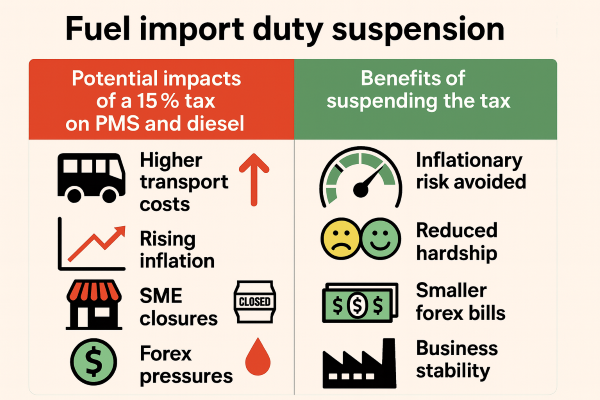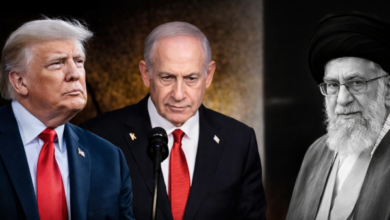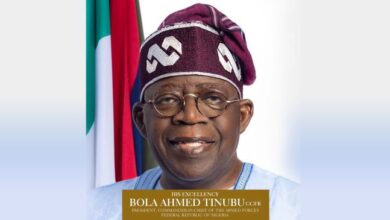FG’s Fuel Import Duty Reversal: Why Economists Say It Saved Nigeria from a Deeper Crisis

Nigeria’s economic management received rare applause over the weekend as financial experts, energy analysts, and political stakeholders broadly endorsed the Federal Government’s decision to suspend the controversial 15% import duty on petrol and diesel.
For an economy already battling inflationary pressure, rising logistics costs, and consumer distress, analysts say the reversal was not just timely — it prevented what could have been a nationwide economic shockwave.
BRANDECONOMY intelligence shows that the proposed Fuel Import Duty tariff, if implemented, would have instantly lifted pump prices above ₦1,000 per litre, triggered new rounds of inflation, stifled small businesses, and further weakened household purchasing power.
Instead, experts describe the suspension as a “necessary economic safety valve” at a moment when Nigeria’s reform fatigue is visibly deepening.
A Reversal that Prevented a Fuel-Price Earthquake
Prof. Ndubisi Nwokoma, a respected economist at Caleb University, said the government’s decision aligned with economic realities. According to him, imposing a fresh tariff on imported PMS and diesel — at a time when inflation, FX volatility, and logistics costs are squeezing millions — would have escalated hardship.
“Government acted in the national interest. Another price shock would have been catastrophic for consumers already stretched beyond capacity,” he noted.
Nwokoma added that the move to pause the Fuel Import Duty shows the administration is increasingly responsive to public feedback — a critical factor for maintaining reform credibility.
“This Would Have Broken Households” — Former CBN Director
Mr Chris Nemedia, former Director of Research at the Central Bank of Nigeria (CBN), was also emphatic.
He argued that the planned import tax failed the economic timing test, describing the reversal as “sound judgement.”
Nemedia urged government to deepen automation across revenue-generating agencies so that efficiency gains — not painful taxes — fund essential development programmes.
Why the Government Stepped Back
The suspension of the Fuel Import Duty came after widespread pressure from economists, civil society groups, transport unions, oil marketers, and political parties.
The Nigerian Midstream and Downstream Petroleum Regulatory Authority (NMDPRA) confirmed the suspension, stressing that “the implementation of the 15% ad-valorem duty is no longer in view.”
Insiders tell BRANDECONOMY that the policy was originally designed to support local refining, reduce reliance on imports, and expand the government’s non-oil revenue.
However, with Nigeria’s refineries still at early stages of revival and Dangote Refinery yet to achieve full-scale PMS supply, stakeholders argued that the timing was premature.
ADC: “Reversal Good — But Policy Flip-Flops Are Damaging”
The African Democratic Congress (ADC) also weighed in, welcoming the reversal but warning that the administration has reversed policies seven times in two years — a trend the party says hurts investor confidence.
ADC’s spokesperson, Bolaji Abdullahi, insisted that no tariff should be implemented without a credible local refining base.
“You cannot tax imported fuel without first proving that domestic supply is reliable. That is economic sabotage by carelessness.”
Experts Warn: Domestic Borrowing, Inflation, and FX Volatility Remain Threats
Energy economists also highlighted deeper risks:
1. Inflationary Spiral
A 15% fuel tax would have multiplied transport costs and pushed inflation beyond current levels, already one of the highest in Africa.
2. Business Shutdown Risk
Small-scale manufacturers and SMEs — heavily dependent on diesel — would have been crippled.
3. FX Burden
With Nigeria still importing over 90% of PMS, analysts say the FX strain remains a major vulnerability.
4. Logistics Shock
Transport unions had warned of a national gridlock if diesel costs spiked again.
NMDPRA: “No Fuel Shortage — National Stockpile Stable”
To calm market nerves, NMDPRA assured Nigerians that:
- national PMS and diesel supplies remain above sufficiency threshold
- distribution networks are stable
- the regulator will take “appropriate measures” to avoid any supply disruption
This assurance comes at a time when global oil prices, shipping costs, and exchange rate swings have made fuel importation increasingly unpredictable.
BRANDECONOMY Analysis: Nigeria Avoided a Policy-Induced Crisis
Our assessment shows that:
- a 15% tariff on PMS and diesel would have added between ₦140–₦200 per litre immediately
- transport fares would have spiked 30–40%
- food inflation would have surged further
- business closures would increase sharply
- consumer disposable income would collapse
Suspending the tariff is therefore not just good politics — it is sound macroeconomic management at a sensitive moment.
What Nigerians now expect is policy consistency and a clear roadmap to domestic refining capacity, cost-reflective pricing, and sustainable energy transition.











